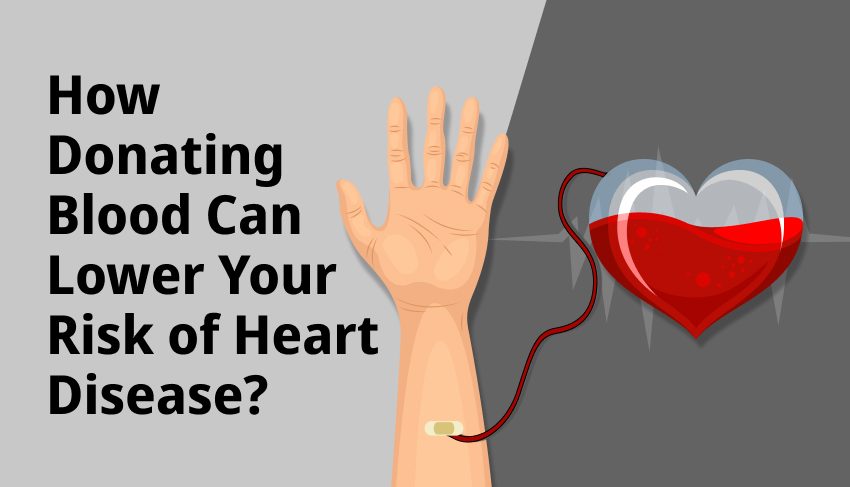Blood donation is a selfless deed that can considerably impact the medical fraternity. It not only saves lives but also provides substantial health benefits to the donor. Blood donation is a generous act that could mean the difference between life and death for patients in an emergency.
The need for blood has been surging over the years due to innovations in healthcare and increased life expectancy. According to the World Health Organisation, donating blood by just 1% to 3% of the total population can meet the entire requirement for blood in the whole country.
But do you know that donating blood regularly can result in a considerable reduction, around 88% in heart disease in both men and women? This article will shed light on the positive impacts of donating blood on reducing the risk of heart disease. We will also delve into the details of why people should donate blood regularly.
Why Should We Donate Blood?
Donating blood is an effective way for people to contribute to the welfare of society. There may be several aspects of why should one donate blood.
Saving lives: The most important reason for blood donation is to save lives in cases of emergency. Patients undergoing surgeries, encountering injuries, or battling medical conditions require consistent blood transfusions. By donating blood you can help save lives.
Meeting demand: Medical establishments and hospitals always depend on a steady supply of blood to meet the exigencies and to perform various medical procedures. By donating blood, you help them to meet their demands.
Supporting medical research: By donating blood, you not only contribute to blood transfusion but also support advanced medical research. Researchers and scientists use donated blood for their advanced research such as to study the diseases and discover new treatment methods.
Health benefits for the donor: Blood donation does not only benefit others, it benefits the donor as well. Blood donation can encourage the production of new and healthier blood cells which helps retain a healthy balance in your body. Donating blood can also reduce the risk of iron overload. Which has many adverse repercussions on the body.
Emotional satisfaction: Blood donation is an act of generosity that brings gratification. When you know that you are going to make a positive impact on somebody’s life, it brings a sense of accomplishment within you.
Who can Donate Blood?
While any healthy individual can donate blood, according to the World Health Organisation (WHO), you have to meet certain criteria.
Age: You must be a minimum of 18 years of age to donate blood. Usually, healthy individuals aged 18 to 65 years can donate blood.
Weight: The minimum weight required to donate blood must be at least 50 kg or 110 pounds. It is to ensure that the donor has enough volume of blood to safely donate without experiencing any adverse effects.
Health: While donating blood the donor has to be in good health and not have any illnesses, infections, or chronic conditions such as HIV/AIDS, hepatitis, and certain cancers. A complete health check-up is done to evaluate the donor’s overall health.
Lifestyle factors: Some individuals who are engaged in high-risk behaviors such as taking drugs intravenously, or having unprotected sex with multiple partners are not allowed to donate blood due to the possible risk of spreading infections. If you have had a tattoo or body piercing done recently, then you will not be eligible to donate for six months from the date of the procedure.
To know more on this read – Donating Blood After Getting a Tattoo.
Medication and travel: If you are taking certain medication that may interfere with the blood donation process, or if you have traveled to places having a high prevalence of infectious diseases or mosquito-borne diseases such as dengue, malaria, and Zika virus infection, you may be temporarily disqualified for blood donation.
Hemoglobin and other vital parameters: The minimum hemoglobin required to donate blood should not be less than 12.5 g/dl. Your pulse should be between 50 and 100/minute with no irregularities. Your blood pressure must be within systolic 100-180 mm Hg and diastolic 50 – 100 mm Hg, and your body temperature must be normal (oral temperature not exceeding 37.50C).
How Blood Donation Lowers the Risk of Heart Disease?
Donating blood at regular intervals has been linked to a lower risk of heart disease because of several factors. Let’s understand these factors:
1. Reduces Blood Viscosity
Blood donation lessens the number of red blood cells thus leading to reduced blood viscosity. A higher blood viscosity obstructs your flow of blood. This can lead to high blood pressure and a higher workload on your heart. Donating a pint of blood (close to 500 mL) can approximately remove 200-250 mg of haem iron from your body.
This loss of iron may reduce the oxidative stress and blood viscosity. This can reduce the thickness of blood and thus, reduce the risk of heart disease in the long run and promote better cardiovascular health.
2. Helps alleviate Iron Overload
Iron overload can increase the oxidative stress in the body and may result in developing atherosclerosis which is a major cause of heart disease. Regular blood donation helps alleviate iron overload and consequently decreases the risk of developing heart disease.
3. May Improve Lipid Parameters
Donating blood at regular intervals can improve your lipid parameters. Regular blood donation may lower iron overload, and this in turn lowers lipid peroxidation. It has also been witnessed that regular blood donors have reduced total cholesterol, LDL cholesterol, and triglyceride levels. All these parameters are linked to a higher risk of developing heart disease.
Why does Blood Donation Make a Difference?
Donating blood has an array of benefits to the donor, including a reduced risk of heart disease. When you donate blood, your body encourages the production of active blood cells to replace the donated volume. This entire process stimulates blood circulation and stops the build-up of old and impaired red blood cells which are known to increase the risk of cardiovascular disease.
Hence, being a regular donor may help promote uninterrupted blood flow, reduce arterial blockages, and reduce the risk of developing heart disease.
Frequently Asked Questions
What are the benefits of donating blood to the heart?
Donating blood regularly may help reduce the risk of cardiovascular disease by depleting the iron overload in the body. It can also stimulate the production of newer blood cells which replace the aging and impaired red blood cells from the body. This helps reduce arterial blockages and encourages smooth blood circulation diminishing the risk of developing heart disease.
Why do I feel so good after blood donation?
When you donate blood, your body starts to replenish the lost blood volume within 48 hours of the donation. All the lost red blood cells are completely replenished within four to eight weeks after the donation. This entire process of replacement helps your body to stay active and makes you feel energetic and efficient.
Can donating blood reduce cholesterol?
Studies suggest that donating blood at regular intervals can significantly reduce the mean total cholesterol, triglycerides, and low-density lipoprotein (LDL cholesterol) levels in comparison to those who do not donate blood.
The Bottom Line
Although blood donation plays a crucial role in saving lives, it is equally beneficial for the donor as well. Through several scientific research studies, it has been established that donating blood frequently can reduce the risk of developing cardiac disease.
By bringing down the blood viscosity, preventing excessive iron storage, and reducing blood cholesterol and triglyceride levels, Blood donation plays a vital part in maintaining heart health. Hence encouraging people to come forward for blood donation not only contributes to a healthier society but also can reduce the chances of increasing heart disease universally.
It is of vital importance to promote awareness regarding the beneficial impact of blood donation and encourage more individuals to become regular blood donors. This in turn can contribute to a healthier community. So donate blood, save lives!
The power to save lives is in your hands. UBlood makes donating blood simple and efficient. Join UBlood and make a difference.

